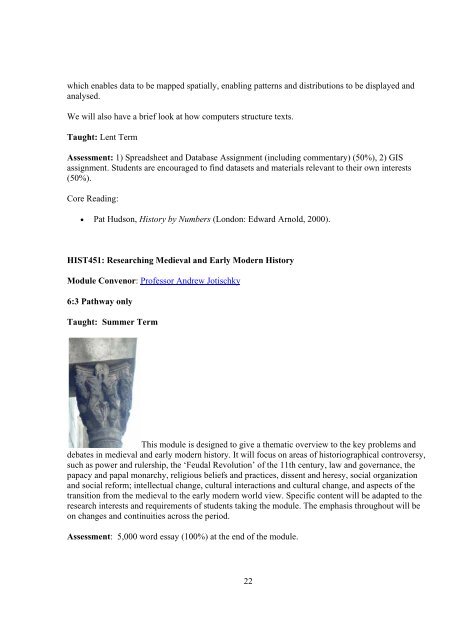M.A. in History Student Handbook 2011-2012
M.A. in History Student Handbook 2011-2012
M.A. in History Student Handbook 2011-2012
You also want an ePaper? Increase the reach of your titles
YUMPU automatically turns print PDFs into web optimized ePapers that Google loves.
which enables data to be mapped spatially, enabl<strong>in</strong>g patterns and distributions to be displayed and<br />
analysed.<br />
We will also have a brief look at how computers structure texts.<br />
Taught: Lent Term<br />
Assessment: 1) Spreadsheet and Database Assignment (<strong>in</strong>clud<strong>in</strong>g commentary) (50%), 2) GIS<br />
assignment. <strong>Student</strong>s are encouraged to f<strong>in</strong>d datasets and materials relevant to their own <strong>in</strong>terests<br />
(50%).<br />
Core Read<strong>in</strong>g:<br />
• Pat Hudson, <strong>History</strong> by Numbers (London: Edward Arnold, 2000).<br />
HIST451: Research<strong>in</strong>g Medieval and Early Modern <strong>History</strong><br />
Module Convenor: Professor Andrew Jotischky<br />
6:3 Pathway only<br />
Taught: Summer Term<br />
This module is designed to give a thematic overview to the key problems and<br />
debates <strong>in</strong> medieval and early modern history. It will focus on areas of historiographical controversy,<br />
such as power and rulership, the ‘Feudal Revolution’ of the 11th century, law and governance, the<br />
papacy and papal monarchy, religious beliefs and practices, dissent and heresy, social organization<br />
and social reform; <strong>in</strong>tellectual change, cultural <strong>in</strong>teractions and cultural change, and aspects of the<br />
transition from the medieval to the early modern world view. Specific content will be adapted to the<br />
research <strong>in</strong>terests and requirements of students tak<strong>in</strong>g the module. The emphasis throughout will be<br />
on changes and cont<strong>in</strong>uities across the period.<br />
Assessment: 5,000 word essay (100%) at the end of the module.<br />
22
















